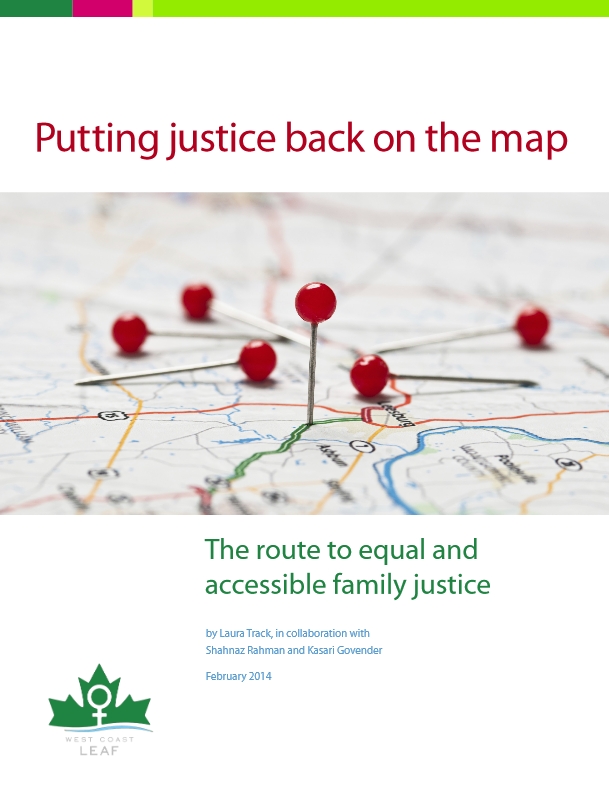
A report released by the West Coast Legal Education and Action Fund is calling on the government to support in-house counsel at shelters and women’s groups.
 The recommendation was one of a number that propose transformative changes to the delivery of legal aid in British Columbia.
The recommendation was one of a number that propose transformative changes to the delivery of legal aid in British Columbia.
West Coast LEAF, a not-for-profit advocating for women’s equality through legal initiatives, also proposes a “student-driven” legal clinic be set up in partnership with the province’s law schools.
The report was written by Laura Track, the group’s legal director. Track says LEAF has been fighting for increased funding to legal aid since at least 2002, when the province began slashing its legal services budget — ultimately providing aid to only victims of violent crime and litigants earning less than $25,000 per year.
As a result, the majority of women in family disputes are being denied access to justice, says Track.
“Without adequate legal representation, women are losing custody of their children. They’re giving up valid legal rights to support a fair division of property. They’re being victimized by litigation harassment, where an abuser uses the litigation process to continue patterns of abuse and coercion and control.”
According to the report, more than 90 per cent of family litigants in the B.C. Provincial Court, faced with daunting legal costs, choose to self-represent, resulting in predictable inefficiencies.
“It leads to increased costs and delays for the justice system and overburdened courts and backlogs, as self-represented litigants try to navigate a very complex legal system,” says Track.
With this report, LEAF is moving beyond calls for increased funding to offer models that can deliver improved access to justice. The first part of the plan involves subsidies that would allow a number of women’s groups — on a pilot-project basis over two or three years — to hire in-house counsel.
Track says professional legal advice is critical at these organizations, where a legal vacuum has thrust social workers and women’s advocates into a role to which they’re wholly unsuited.
“Those organizations have been doing everything they can to fill the gaps and provide legal assistance that women need,” she says. “But they are not legally trained and they are not qualified to offer advice — and they certainly can’t represent someone.”
Indeed, a report issued earlier this month by Statistics Canada revealed just as much. According to the 2011/212 Victim Services Survey around 90 per cent of victims seek out information about the justice system, but they’re getting that information (in 74 per cent of instances) from police and community groups.
Giving women’s organizations access to in-house lawyers would not only give abuse victims access to justice, says Track, it would also give social workers the ability to focus on what they’re good at.
“They could be offering safety planning and support with finding housing and the things that they were set up to do, but instead they’re spending all of this time helping women navigate the legal system — and it’s not an efficient approach.”
The second part of the LEAF plan envisions a “student-driven” legal clinic set up on the lower mainland. It envisions a semester-long clinical program, in partnership with the province’s law schools, where students could gain practical experience, such as, according to Track, “interviewing skills, learning about the core process, even having the opportunity to be on their feet in the Provincial Court.”
LEAF is also open to the idea that the legal clinic, overseen by an advisory committee of lawyers, might also provide articling posts for law school graduates — a valuable win-win for family litigants and students who can’t find positions at law firms.
Track admits to challenges in costing out these programs, which rely on numerous variables. However, she estimates the student clinic could be built for $500,000, while support for a small team of in-house lawyers at a limited number of women’s organizations could begin on a pilot-project basis.
Moreover, she says the B.C. Legal Services Society has a surplus that could easily be put towards such a plan. All that’s required, she says, is a green light from the province.
“We are hoping for immediate action,” says Track. “That’s why we’ve pitched it as pilot projects—because it can begin immediately, perhaps on a two- or three-year basis, and then evaluated at the end and expanded on the basis of what we learn from the pilot.”